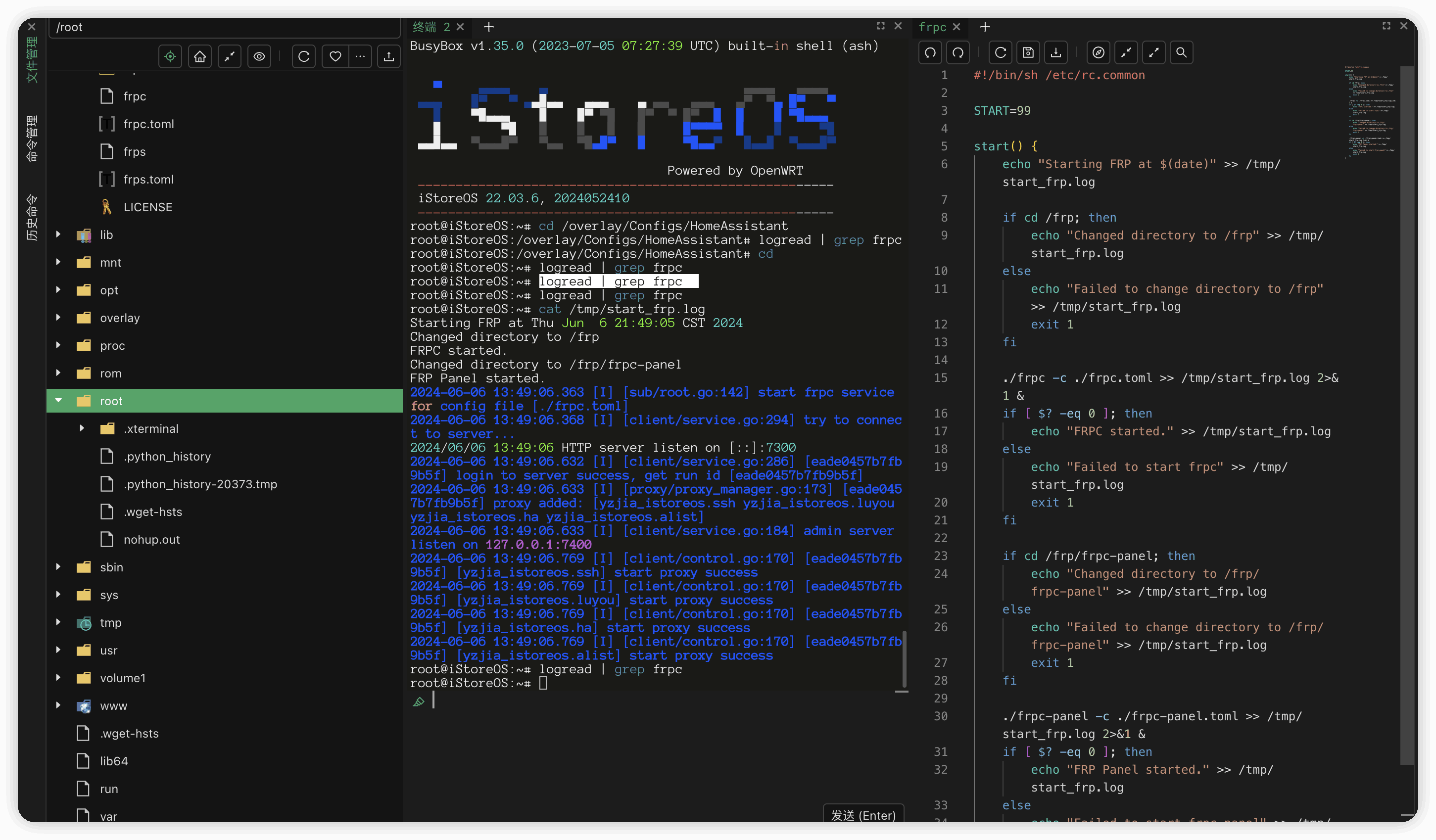一、安装HACS:
步骤略,自行解决,网上安装方式很多。
二、安装小米集成
在HACS中安装Xiaomi Miot Auto9(小米集成)
三、构建随机播放py程序
3.1 利用ssh进入系统,在homeassistant文件夹新建www文件夹,在www文件夹里面新建music用于存放要播放的音乐。
3.2 在music文件夹新建文件musicServerForXioai.py,然后将下面代码复制进去。
3.3 修改代码中存音乐的目录,将music这个文件夹绝对路径填入。
# coding=utf-8
# http随机音乐播放器
# 给小爱音箱用于播放nas的音乐
import os, random, urllib, posixpath, shutil, subprocess
from http.server import HTTPServer, BaseHTTPRequestHandler
# 端口号
port = 8080
# 存音乐的目录,实际存放music的地方,后面有介绍。
fileDir = '/www/music/'
# 实时转码需要依赖ffmpeg的路径 如果为空就不转码
ffmpeg = '/usr/bin/ffmpeg'
fileList = None
fileIndex = 0
def updateFileList():
global fileList
global fileIndex
try:
os.chdir(fileDir)
except Exception as e:
print(e)
print('ERROR: 请检查目录是否存在或是否有权限访问')
exit()
fileIndex = 0
fileList = list(filter(lambda x: x.lower().split('.')[-1] in ['flac','mp3','wav','aac','m4a'], os.listdir('.')))
fileList.sort(key=lambda x: os.path.getmtime(x))
fileList.reverse()
print(str(len(fileList)) + ' files')
# 在类的顶部添加一个计数器变量
playlist_request_count = 0
class meHandler(BaseHTTPRequestHandler):
def translate_path(self, path):
path = path.split('?',1)[0]
path = path.split('#',1)[0]
trailing_slash = path.rstrip().endswith('/')
try:
path = urllib.parse.unquote(path, errors='surrogatepass')
except UnicodeDecodeError:
path = urllib.parse.unquote(path)
path = posixpath.normpath(path)
words = path.split('/')
words = filter(None, words)
path = fileDir
for word in words:
if os.path.dirname(word) or word in (os.curdir, os.pardir):
continue
path = os.path.join(path, word)
if trailing_slash:
path += '/'
return path
def return302(self, filename):
self.send_response(302)
self.send_header('Location', '/' + urllib.parse.quote(filename))
self.end_headers()
def do_GET(self):
global fileList
global fileIndex
global playlist_request_count
print(self.path)
if self.path == '/':
self.return302(fileList[fileIndex])
fileIndex += 1
if fileIndex >= len(fileList):
fileIndex = 0
elif self.path == '/random':
updateFileList()
random.shuffle(fileList)
self.return302(fileList[0])
fileIndex = 1
elif self.path == '/first':
updateFileList()
self.return302(fileList[0])
fileIndex = 1
elif self.path == '/playlist':
playlist_request_count += 0
if playlist_request_count <= 10:
updateFileList()
random.shuffle(fileList) # 在生成播放列表前随机打乱音乐文件列表
self.send_response(200)
self.send_header("Content-type", "application/vnd.apple.mpegurl")
self.send_header("Cache-Control", "no-cache")
self.end_headers()
m3u8_content = "#EXTM3U\n"
m3u8_content += "#EXT-X-VERSION:3\n"
m3u8_content += "#EXT-X-ALLOW-CACHE:NO\n"
m3u8_content += "#EXT-X-TARGETDURATION:3\n"
# 使用打乱后的音乐文件列表生成播放列表
for i, file_name in enumerate(fileList):
if os.path.isfile(file_name):
m3u8_content += f"#EXTINF:3.000,\n{urllib.parse.quote(file_name)}\n"
m3u8_content += "#EXT-X-ENDLIST\n"
self.wfile.write(m3u8_content.encode())
else:
self.send_response(500)
self.send_header("Content-type", "text/plain")
self.end_headers()
self.wfile.write("Too many playlist requests".encode())
else:
path = self.translate_path(self.path)
print(path)
if os.path.isfile(path):
self.send_response(200)
if ffmpeg and path.lower().split('.')[-1] not in ['wav']:
self.send_header("Content-type", 'audio/wav')
self.send_header("Accept-Ranges", "none") # Ensure that the server doesn't support byte ranges
self.end_headers()
pipe = subprocess.Popen([ffmpeg, '-i', path, '-f', 'wav', '-'], stdout=subprocess.PIPE, bufsize=10 ** 8)
try:
shutil.copyfileobj(pipe.stdout, self.wfile)
finally:
self.wfile.flush()
pipe.terminate()
else:
self.send_header("Content-type", 'audio/mpeg')
self.send_header("Accept-Ranges", "none") # Ensure that the server doesn't support byte ranges
with open(path, 'rb') as f:
self.send_header("Content-Length", str(os.fstat(f.fileno())[6]))
self.end_headers()
shutil.copyfileobj(f, self.wfile)
else:
self.send_response(404)
self.end_headers()
if os.system("nslookup op.lan"):
print('ERROR: 请将op.lan指向本机ip,否则小爱音箱可能无法访问')
updateFileList()
HTTPServer(("", port), meHandler).serve_forever()
四、启动py
4.1 创建的Shell脚本,代码如下。
#!/bin/bash
##进入music文件夹
cd ****/www/music
##启动py程序
./musicServerForXioai.py4.2 要执行Shell脚本,首先需要给予文件执行权限,可以使用命令chmod +x script.sh来设置,script.sh为创建的文件名。
4.3 之后,可以通过./script.sh或者sh script.sh来运行脚本,然后开启以及后台运行以及开机启动。
五、测试播放列表
浏览器访问 http://你的IP地址:8080/playlist,你会得到一个,3u8的文件,反复测试多次,每次下载的播放列表歌曲顺序都不一样。
六、在homeassistant中设置场景自动化
测试步骤:开发者工具–服务–play media-选择实体-ID为链接地址,选择播放
添加自动化步骤:配置–自动化与场景–创建自动化–添加动作–填写相关内容,如下图。
目标:选择小米音响
内容ID:就是homeassistant的ip地址加上/playlist
内容类型:必须是music
© 版权声明
文章版权归作者所有,未经允许请勿转载。
THE END







暂无评论内容